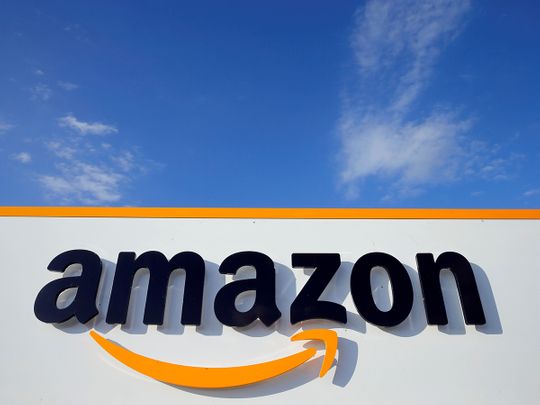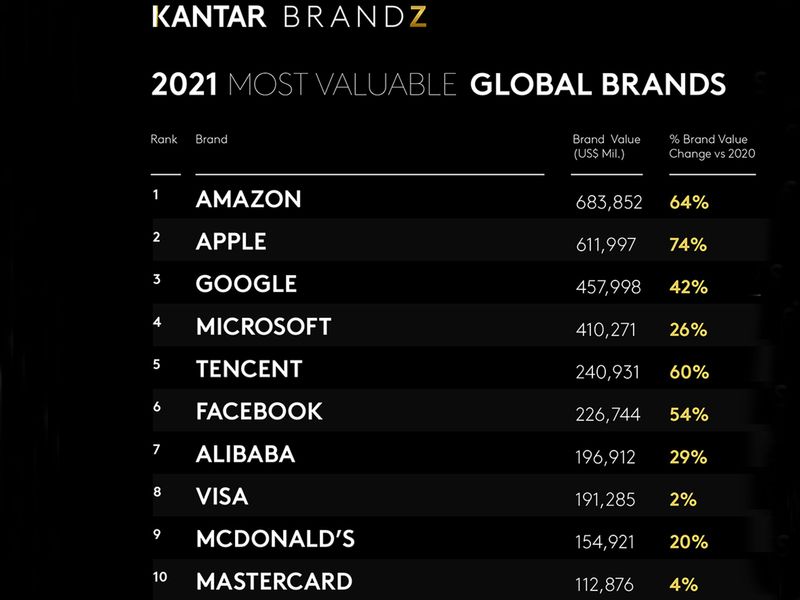
Dubai: Amazon extended its lead as the world’s most valuable brand – up 64 per cent to $684 billion - even as other online-focussed platforms raised their profile and value during the year of the COVID-19. Apple came in second, at $612 million – but the fastest gainer was electric carmaker Tesla, which gained 275 per cent year-on-year to $42.6 billion.
The biggest surprises, however, were delivered by Chinese brands such as TikTok and the relatively lesser known Pinduoduo, Meituan and Moutai, each of which more than doubled in value. This is according to the global communications agency Kantar BrandZ’s ‘Most Valuable Global Brands 2021’.

Another must-have tool of the COVID-19 phase – Zoom’s videoconferencing app – eased its way into the Top 100 and finishing at 52nd with a $36.9 billion value.
“Despite the strong headwinds caused by COVID-19, we clearly saw that brands that invested in knowing and understanding their consumers’ evolving needs, and addressing them, did well,” said Amol Ghate, CEO Middle East for the Insights Division at Kantar. “These brands made sure they remained meaningful in the evolving context, which by default ensured consumers continued to choose them over competition.
“We also see that brands that continue to meaningfully differentiate themselves, and amplify that meaningful difference by communicating with consumers, sustain strong performance and grow even in difficult times. And that is the power of brand building.”
The brand values are entirely different from market capitalisation or the innate value associated with a private company. Kantar’s annual brand valuation rankings combine financial data with brand equity research.
A hot streak
Here’s a number to chew on – the Top 100 global brands have a combined value of $7.1 trillion – and that’s equivalent to the combined GDP of France and Germany. US brands dominate the rankings, with 56.
In value terms, the $7.1 trillion represents a 42 per cent increase – and is also more than four times the gains recorded by the Kantar rankings in the last 15 years? And the reason? It was “driven by confidence derived from vaccine availability, economic stimulus packages and improving GDP outlooks,” according to the report.
Ecom and tech all the way
For global tech, 2020 has been a year like no other. Each extension of lockdowns and the need for remote work and living extended their supremacy. Much the same was happening with ecommerce, with more users clambering on board.
“With global ecommerce growing from 12 per cent to 15 per cent of all sales in 2020, it has been a positive year for brands involved in that value chain – from the retailers through to the couriers like FedEx and UPS,” said Nathalie Burdet, CMO (Chief Marketing Officer) of Kantar. “However, we have also seen growth in industries where many were predicting challenges early in the pandemic.
“Apparel brands for example have collectively grown even more than media and entertainment brands in the ranking. And luxury brands, despite reduced travel and lockdowns globally, have refocused their energies and seen growth as a result.”
Subscriptions work
Netflix is the poster brand of the subscription model, but others were getting their acts together in this space. There was Microsoft, which came up with offers to adapt to the new work-from-home requirements. Its Xbox too thrived in this environment, as did music streaming leader Spotify. Disney was the other winner, lining up against Netflix on web streaming. Subscription services also delivered for the likes of Nike and Mercedes-Benz as it did for fashion brand Lululemon.
“We track the stock market performance of our strongest brands and have seen these recover twice as fast as other key indices,” said Burdet. “Our analytics have uncovered that 70 per cent of what makes a brand successful is executing four fundamentals well: providing superior experience across consistently branded touchpoints, a range of well-designed and functional products and services, convenience, and exposure through great advertising.
“However, COVID-19 has emphasised consumer values such as trust and reliability. Those brands that are evolving their values, projecting leadership on these issues are demonstrating differentiation and standing out.”








